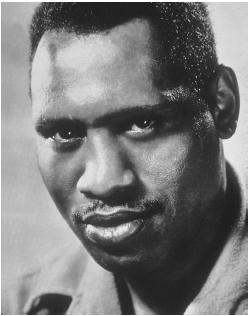Paul Robeson

The Great Paul Robeson Was Born In Princeton, New Jersey On April 9, 1898.
Paul Robeson’s Distinguished Career As An Actor, Scholar ( He Was Phi Beta Kappa And Valedictorian Of His Graduating Class At Rutgers University), Activist, Athlete (Two-Time All America Football Player At Rutgers University And Earned 15 Letters In Basketball, Track, Baseball And Football ), Lawyer, Singer, Writer, Multilinguist (He Spoke More Than 20 Languages), Made Him One Of The Most Versatile Talents Produced During The Harlem Renaissance.
He (Along With Fritz Pollard) Is Thought To Be The First African American To Play In The American Professional Football Association, Known Today As The National Football League.
In 1924 He Made History By Becoming The First African American To Play Opposite A White Woman In An American Stage Play. He Played The Male Lead In Eugene O’Neill’s All God’s Chillun Got Wings. Robeson Would Go On To Have A Number Of Notable Acting Roles, Including The Emperor Jones And Othello.
Paul Robeson Understood The Power Of His Celebrity And Combined It With Activism To Fight Injustice Among His People. He Opposed Segregation In The North And South. He Also Spoke Out Loudly Against Lynching And In 1946 Founded The American Crusade Against Lynching.
Although He Never Joined The Communist Party, Robeson Was Branded A Communist And "Blacklisted" Because Of Perceived "Pro-Soviet" Statements, Liberal Views And Opposition To The Cold War.
After Making Several Trips To The Soviet Union, He Felt That There Was Less Recial Prejudice There And Openly Expressed This In The United States.
His Records Were Removed From Shelves And His Personal Appearances Were Canceled. He Was Banned From Radio, Television And The Stage, And His Passport Was Revoked.
Despite Not Having A Passport, He Returned To Europe In 1958 Where He Lived For Five Years In Weakened Health.
He Returned To The United States In 1963 And Lived In Relative Obscurity Until His Death In 1976.
"In Order For Black History To Live, We Must Continue To Breathe Life Into It." -- Hubert Gaddy, Jr.










